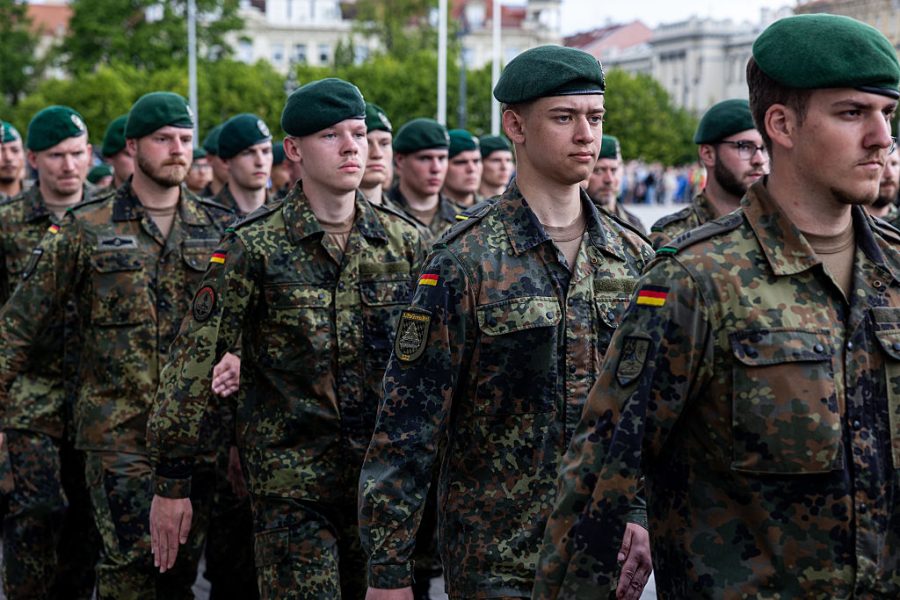Germany’s new chancellor Friedrich Merz seems serious about his pledge to make the Bundeswehr the ‘strongest conventional army in Europe’. Yet less than a month into his chancellorship, a daunting realisation is dawning on Berlin: without resorting to conscription, there is little prospect of growing the German army or fulfilling Merz’s ambitious promise.
Merz’s defence minister Boris Pistorius – the only SPD politician from Olaf Scholz’s administration to remain in the cabinet – is in Brussels today to commit Germany to raising defence spending to 5 per cent of GDP by 2032. This spending would be split, with 3.5 per cent dedicated to core military spending, and the remaining 1.5 per cent used on defence-adjacent projects, such as maintaining and building more critical infrastructure like roads, bridges and railways. This is a particularly striking commitment for Pistorius to make considering that Germany only met Nato’s current target of 2 per cent for the first time last year.
Germany’s army has a retention problem: it is at risk of shrinking – not growing
Germany’s ability to commit to the new Nato defence target without resistance has been made easier by the spending reforms Merz forced through the Bundestag shortly after he won February’s federal election. Gone are the restrictions on the country’s infamous ‘debt brake’, meaning defence spending over 1 per cent will now be exempt, while a new special €500 billion (£420 billion) infrastructure fund will count towards the 1.5 per cent defence-adjacent spending demanded by Nato. But it was remarks made by Pistorius as he arrived in Brussels that betrayed just how tricky the Bundeswehr’s return to strength remains.
Commenting on the new defence capability targets Nato’s defence ministers are planning to agree on today, Pistorius elaborated on what this would mean for the Bundeswehr: ‘We assume – but this is only a rough estimate, to be clear – that we will need around 50,000 to 60,000 more soldiers in the standing armed forces than we have today.’ Notably, he then added: ‘And at the same time, the question will naturally arise: Will the new military service model be sufficient over the next few years?’
In the coalition agreement Merz’s CDU party struck with the SPD, the two agreed to introduce a new model of military service that they hoped would boost the army’s numbers. Based on Sweden’s volunteer model, the government’s new recruitment scheme will see eligibility questionnaires sent to all German 18-year-olds, a percentage of whom will then be invited to join the Bundeswehr. The reintroduction of military service in this way was considered far more politically palatable than reintroducing conscription in one fell swoop as the CDU had been pushing for.
Pistorius was this voluntary military service scheme’s biggest champion. The defence minister had been preparing to introduce legislation formalising a nearly identical scheme as long ago as last autumn, before his plan to do so was scuppered by the early election called by Scholz in December. If even he is questioning its effectiveness now, it appears the scheme has little chance of success.
The unavoidable problem facing Merz and Pistorius is that, as things stand, Germany’s army has a retention problem: it is at risk of shrinking – not growing. The Bundeswehr currently has a target of reaching 203,000 active soldiers by 2031 and yet at the last count at the end of 2024 it stood at just 181,150 soldiers, shrinking ever so slightly compared to the year before. This is despite over 20,000 new recruits joining the armed forces in the same time period.
Years of underfunding have left the Bundeswehr crumbling and neglected. Conditions for soldiers are unappealing: crumbling barracks, a dearth of weaponry for troops to train with, long stints away from family. The average age of the German soldier is now 34, with every sign this is creeping upwards. This is all before Germans’ self-instilled post-second world war aversion to military might is considered. Simply put, Germans – and in particular young ones – don’t want to be called on to defend their country.
Pistorius isn’t the first senior German politician or official to float needing to reconsider the government’s voluntary recruitment model. Earlier this week, the country’s homeland defence chief Andreas Henne also raised doubts the army could recruit enough soldiers using the current model: ‘To protect defence-critical infrastructure, I simply need more soldiers than I can currently provide,’ he said. One survey conducted in March highlighted the scale of the challenge facing Germany’s defence chiefs: 61 per cent of 18-29 year olds, the age group who’d be most affected by a return to conscription, are against it.
Merz and Pistorius may soon not have much choice but to introduce conscription. At the weekend, the Bundeswehr’s Inspector General Carsten Breuer was the latest to warn that Russia could be ready to attack a Nato state by 2029. ‘We have to be ready by 2029… If you ask me now, is this a guarantee that’s not earlier than 2029? I would say no, it’s not. So we must be able to fight tonight,’ he said.
The reintroduction of conscription in Germany appears to be an increasing certainty. The Bundeswehr knows it, Pistorius seems to know it, as does Merz. The question now is, does Germany’s new chancellor have the stomach to trigger it?








Comments